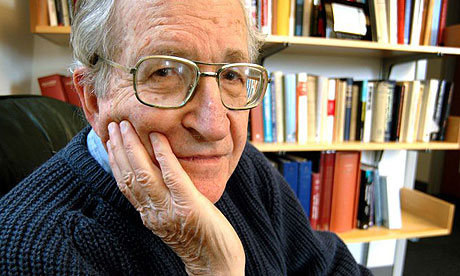Occupy Boston marches into week four
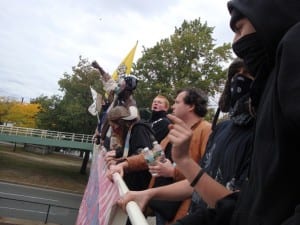
Demonstrators hang their banner off a footbridge over Storrow Drive
This week, the fourth since setting up camp on September 30, Occupy Boston has increased its visibility through a series of marches including a trip to Harvard Square (by way of the Head of the Charles Regatta), several hostile visits to FOX News and the home of a Bank of America president, angry protests against the police response to Occupy Oakland, and a somber, rainy morning walk to the trial of Tarek Mehanna, 28, a Sudbury man accused of being a propagandist for Al-Queda.

March to Cambridge
On October 23, about 50 protestors from Occupy Boston took a meandering route from their tent city in front of South Station to "the Pit," an area in Harvard Square associated with various countercultures over the decades. En route they temporarily hung a "We are the 99%" banner from a footbridge over Storrow Drive and blocked traffic one-way on the Mass Ave bridge. They also paraded through the Head of the Charles Regatta chanting slogans such as "we got sold out, banks got bailed out" and "this is what democracy looks like" as a few people gave them thumbs up.
While certain previous marches – boosted by the support of labor unions and student groups from local colleges – have swelled into the thousands, this smaller protest was notable as Occupy Boston's first excursion outside the city. Dozens of people along the route showed their approval of the demonstrators; no detractors were obvious. The protest, though small by Occupy Boston standards, had style. Marching to a drum beat, they followed three masked flagbearers with the America flag flanked by a "don't tread on me" flag on each side. The demonstrators stopped along the route as often as necessary to regroup behind their banner or, even, sit down and decide where to go next.
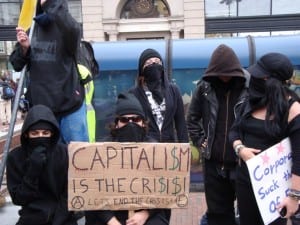
These protestors, some active within the Direct Action working group, wear masks and hold a sign. (Blast Staff photo/John Stephen Dwyer)
Despite many of the participants being masked or otherwise dressed in a way that might intimidate, the flag-waving march was oddly reminiscent of a patriotic scene from Boston's historic past. A few onlookers seem frightened by this loud group of people unaccompanied by uniformed police. Some clutched their children or scurried to give the marchers a wide birth. Most merely gaped. Plenty took pictures or video. A few punched their fists in the air to the beat of the protestors' drum.
Among Sunday's masked marchers, several are associated with Direct Action, a close-knit cadre of young people within Occupy Boston that plans protest marches and, more rarely, bolder acts of civil disobedience. But the demonstration also parents, children and at least one grandmother, Mary Andriotakis, 53, who came in from Sudbury with her husband, Chuck Andriotakis, 62, and grandsons Levi, Sam and Joe (ages 5, 6 and 11).
"I come into Occupy Boston whenever I can, and I bring whoever I can," Mary Andriotakis said. "I thought I wouldn't be able to go today because I have my grandchildren. But it's a beautiful day and I brought them. It's great for them to be able to be a part of this."
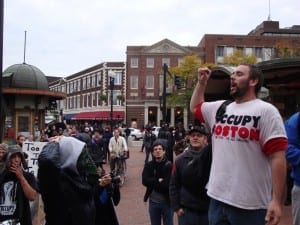
John Murphy, 24, of Falmouth, speaks to people in Harvard Square while wearing a shirt he made back at the Sign Tent at the Occupy Boston campground. (Blast Staff photo/John Stephen Dwyer)
Her grandsons held signs and obviously enjoyed chanting "We are the 99 percent" along with demonstrators drawn from local colleges, towns, and the streets. At one point, the boys shyly tried out the people's mic, a movement phenomenon through which a crowd repeats and amplifies a speaker's words. Andriotakis, having two children who volunteer at the Medic Tent in the campground, later said "I asked [my grandsons] which they like better, Occupy Boston or the Children's Museum and they said 'Occupy Boston, Occupy Boston!'"
After going through Downtown Crossing and cutting through Boston Common, the march turned left at the State House and headed down Beacon Street. They stopped to jeer and flip the bird at what may be the Beacon Hill townhouse of Robert E. Gallery, a local Bank of America president. Reaching a footbridge to the Charles River, the protestors ran onto it quickly and suspended a banner over Storrow Drive for several minutes on each side. The banner, the same one they march behind, reads "we are the 99%" and is decorated with white hands on a pink background. Less legibly, "occupyboston.com" is printed above the motto and "and so are you and you and you and you and me" is written in cursive writing below.
When they finally arrived in Harvard Square, protestors held a rally where they used the people's mic to explain the purposes of their protest. They also answered questions and talked to people one-on-one. At the end of the day, the demonstration left the marchers in high spirits. One elated woman said, "We've had marches much bigger than this, but I don't think we've ever seen so much positive attention. The movement is definitely growing. People are becoming more aware."
The group took the Red Line from Harvard Square back to South Station, each person paying their fare. They re-entered the tent city just as a group of smiling Sikhs was serving hot tea and warm food they had prepared off-site. By this hour, Occupy Boston was teeming with people who jostled shoulder-to-shoulder to pass along the narrow paths.
Chomsky and an almost-confrontation
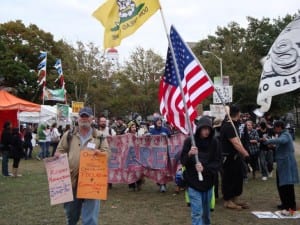
Protestors young and older are visible as Occupy Boston parades through the 47th edition of the Head of the Charles Regatta. (Blast Staff photo/John Stephen Dwyer)

http://occupybostonglobe.com/ "It's awful how they hate America"
Last weekend, Occupy Boston showed signs of losing momentum as the majority settled into activities that didn't bring them into contact with those outside the camp. A march was planned for 6 pm on Saturday night, but when Noam Chomsky was rained out on Wednesday he moved his lecture to that time instead.
An estimated 1,000 people were present but Chomsky, 82, spoke at conversational volume and didn't use the people's mic. Despite him holding two microphones, at least half those assembled couldn't hear him. Many occupiers and visitors, happily anticipating Chomsky's visit for days, had their spirits dashed.
An impromptu march took place when Chomsky finished and culminated in about 100 protestors assembled on the same spot of Rose Kennedy Greenway where 141 people were arrested on October 11. A tight cluster of Boston Police stood by, frowning and talking into radios. Using the method of direct democracy popular across the Occupation Movement, the protestors held a General Assembly. People spoke from atop the gray pumpkin statue that makes a good soapbox.

Occupy Boston free t-shirt
Despite tough talk about taking that park again, it didn't happen. Some didn't like the idea of doing something so important without the consensus of the whole Occupy Boston community. Some argued the park should be seized during the day so people working in the surrounding office buildings could see whatever ensued. Some, it was clear, simply didn't have the nerve.
Out of the park and into the streets

With the Boston skyline visible beyond crew teams on the Charles River, demonstrators use a hand signal to indicate approval during discussion. (Blast Staff photo/John Stephen Dwyer)
The next day, Sunday, the Occupy Boston encampment seemed to be under a lull. Certain tents designed for communal functions had lost their identifying signs days before or otherwise appeared closed for business. A few busy volunteers complained too many people were holed up in their tents avoiding the gritty realities of life in Dewey Square [link to crime & addiction article]. Positive energy at the campsite seemed in short supply; even the mellow people at the Sacred Space were getting cranky from the struggle to prevent it from becoming another messy public dormitory.

At 1 p.m., only a dozen people assembled for a march planned by Direct Action ("DA"). Members of DA, who tend to be younger than the camp as a whole, were livid at the low turn out. Young men and women clenched their fists and snarled in frustration, "people need to get the fuck out of their tents!" Rather than cancel the march, DA members led their small contingent four times around and through the Occupy Boston camp chanting "out of the park and into the streets" and, specially for this occasion, "out of your tents and into the streets."
Some habitués of the drum circle agreed to go to the march when confronted by DA members but soon sneaked back into camp. In the end, about 50 people accompanied Occupy Boston all the way to Cambridge.
Free School University Classes (10/28 – 10/30)
Class descriptions at: http://www.occupyboston.org/calendar/ Classes meet at the bright, orange Soap Box, at the north end of Dewey Square.
FRIDAY, October 28
3:00pm – 4:30pm
Challenging Basic Assumptions: Personal & Political with Dennis Fox
4:00pm – 5:00pm
Crafting Your Story: A Fiction Workshop with Askold Melnyczuk
6:00pm – 7:00pm
The Howard Zinn Memorial Lecture Series: Chand Montrie (UMass Lowell), author of "A People's History of Environmentalism in the United States"
SATURDAY, October 29
4:00pm – 5:00pm
Glenn Greenwald: With Liberty and Justice for Some
5:00pm – 6:00pm
The Howard Zinn Memorial Lecture Series: Fred Magdoff
SUNDAY, October 30
1:00pm – 3:00pm
How To Run For Office
1:30pm – 3:00pm
Occupy Boston Writing Workshop: The Other 99%
4:00pm – 5:00pm
The Decline of Middle Class Incomes and Political Inequality with Dr. Ben Tafoya
5:00pm – 6:00pm
The Howard Zinn Memorial Lecture Series: Anthony Arnove, who co-authored "Voices of a People's History of the United States" with Howard Zinn
Friday 10/28 at 4:30pm is the 1st FSU Volunteers Meeting:
Meet at the library 4pm to set agenda
FSU is looking for:
Drupal Developer – Open Scholar version, needed for a few things:
Context, Internationalization, Media, VOIP, Advanced Calendar, SMS.
Also:
A canopy, bull horn, sheet protectors, paper, pens and clip boards as well as bright orange fabric to designate the FSU space.

Here in Logistics,
we've been overwhelmed with gratitude for all of the wonderful donations we've received. From blankets to flashlights to an awesome Logistics sign, the community is really turning out to support us.
That being said, with winter quickly approaching, Winterization has become our primary concern for folks in camp as well as logistically (in terms of supplies and donations). A few of our team now sit on the Winterization Committee and are in the process of brainstorming ideas, going over blueprints of possible solutions, and working late to try and solve some of the coming obstacles.
We are in desperate need of certain supplies in order to winterize Boston's Tent City. And we need these quickly! Our current list of most pressing needs:
- 0 degree sleeping bags
- Military style/surplus tents
- Hot Food
- Socks and Footware
- Cots
- Greenhouse Materials: PVC, EMT, PPL
- EPS, extruded polystyrene
- Shovels
We are also actively looking for ideas on where to procure outside heat and searching for a large public assemble space outside of Dewey Square, preferably indoors!
In an effort to make donations more accessible to the wider community as well assist in the online ordering process for folks from far away, we now have a mailing address! We would greatly appreciate your continued support, and we would love to see some packages come our way.
Occupy Boston
PO Box 51162
Boston, MA 02205
In addition, in order to prepare for the coming cold, we are beginning an Adopt-A-Camper Program. We are asking folks who live in the community to step up and offer hot showers or even a warm place to sleep if possible on the very cold nights if needed. We'll put you in contact with this camper, or two, or three or how ever many folks you're willing to adopt! This way we can help make sure that all of the Occupiers are safe, warm, and have a respite from the cold this winter. In get involved in this program, or if you have any questions, please email logistics@occupyboston.org

great, the best occupy wall streeet cartoon so far!!
Likens Chinese Tiananmen Square Pro Democracy movement against undemocratic Totalitarian Tanks to 99% people protestor vs undemocratic totalitarian investor class.banking finance elites.
Friday, October 28
9:00am
Open Group Meditation
12:00pm
Faith and Spirituality Group Meeting
12:30pm
Nurses Rally at Dewey
1:30pm
Yoga
2:00pm
Concert: Zanna
3:00pm
FSU Teach-In: Challenging Basic Assumptions, Personal & Political
4:00pm
Flu clinic: shots and spray
4:00pm
FSU Call for Collaboration and Participation | Keep the Free School University Healthy!
4:00pm
FSU: Crafting Your Story, A Fiction Workshop
4:00pm
Suffering and Compassion in Tibetan Buddhism: Meditation and Discussion with Joe Hodgkin
5:00pm
FSU: The Howard Zinn Memorial Lecture Series, Chand Montrie
5:00pm
Riki Ott
6:00pm
Outreach Meeting
6:00pm
Transparency Working Group
7:00pm
OB Ideas Public discussion: How does OB preserve it's momentum?
9:00pm
Open Group Meditation
Saturday, October 29
9:00am
Open Group Meditation
10:00am
FSU Workshop: The Practice of Non-Violence and Civil Disobedience
12:00pm
Faith and Spirituality Group Meeting
12:30pm
Non-Violence Working Group
1:00pm
Solidarity March
1:30pm
Yoga
2:00pm
Winterizing meeting
3:00pm
**Concert:Cowgill**
3:30pm
Women's Caucus
4:00pm
**Concert:The Doctors Fox**
4:00pm
FSU: Glenn Greenwald, With Liberty and Justice for Some
5:00pm
**FSU: The Howard Zinn Memorial Lecture Series, Fred Magdoff
7:00pm
General Assembly
9:00pm
Open Group Meditation
Sunday, October 30
9:00am
Open Group Meditation
11:00am
(POSTPONED) FSU: Fair Trade Coffee Hour and Discussion
12:00pm
Children's Program
12:00pm
Faith and Spirituality Group Meeting
1:00pm
FSU: How To Run For Office
1:30pm
FSU Writing Workshop: The Other 99%
1:30pm
Yoga
2:00pm
** Concert: TBA **
2:00pm
Art Committee Meeting
3:00pm
Sacred Circle Dancing in the Streets with Ellen Kennedy
4:00pm
**FSU: The Decline of Middle Class Incomes and Political Inequality
5:00pm
Lutheran Reformation Sunday
5:00pm
**FSU: The Howard Zinn Memorial Lecture Series, Anthony Arnove
6:00pm
**FSU Book Reading with Aidan Parkinson
7:00pm
General Assembly
9:00pm
Open Group Meditation
9:30pm
Ideas working group meeting
Monday, October 31
9:00am
Open Group Meditation
12:00pm
Faith and Spirituality Group Meeting
1:00pm
Student Zombie Walkout
1:00pm
**FSU: Consensus: So That All Voices May Be Heard, a Workshop with C.T. Butler
1:30pm
Yoga
4:30pm
** Concert**- for the 99%: Education is a Right.
6:00pm
**Comedian:Sandra Bernhard will be appearing/giving away tickets to her sold out shows!
7:00pm
Info Tent Volunteer Training
9:00pm
Open Group Meditation
Tuesday, November 1
9:00am
Open Group Meditation
12:00pm
Faith and Spirituality Group Meeting
1:00pm
**FSU: Consensus, So That All Voices May Be Heard, a Workshop with C.T. Butler
1:30pm
Yoga
3:00pm
**Facilitation Workshop by C.T. Butler
3:00pm
FSU: Money, Banking, and Democracy
5:00pm
Anarchist Potluck / Caucus
5:30pm
Women's Caucus
6:30pm
Concert: Zumix Drumline
7:00pm
General Assembly
9:00pm
Open Group Meditation
Wednesday, November 2
9:00am
Open Group Meditation
12:00pm
Faith and Spirituality Group Meeting
1:00pm
Non-Violence Working Group
1:30pm
Yoga
5:00pm
**Holding for Rebooking Concert
6:00pm
Ideas Working group meeting
6:30pm
**FSU: Big Pharma, Another Big Player on Wall Street
7:00pm
OB Ideas Public discussion: Topic TBD
9:00pm
Open Group Meditation
Thursday, November 3
9:00am
Open Group Meditation
9:30am
**FSU Workshop: My Red Carpet Moment, How Do I Best Express What I Do?
12:00pm
Faith and Spirituality Group Meeting
1:30pm
Yoga
2:00pm
Historical March Campaign
4:00pm
**FSU: The Howard Zinn Memorial Lecture Series, The Perils of American Democracy
5:00pm
**FSU: The Housing Crisis, Where Did it Come From, Where are we Going?
7:00pm
General Assembly
9:00pm
Open Group Meditation
9:00pm
Winterizing meeting
 Stumble It!
Stumble It!

 by Jacob G. Hornberger
by Jacob G. Hornberger 



